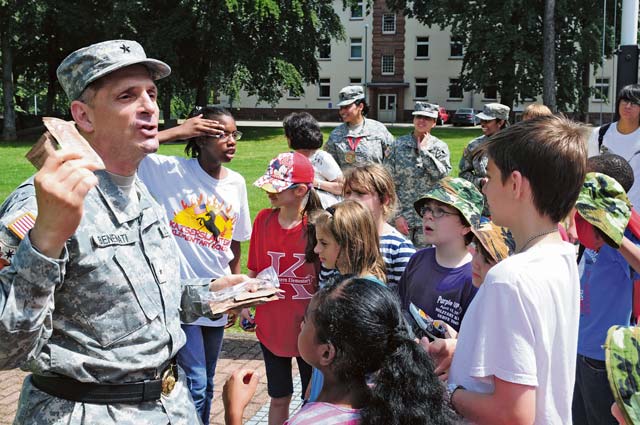
More than 20 German high school students from the Rittersberg Gymnasium in Kaiserslautern got a first-hand look behind the fence at life on a U.S. military base during a visit to Panzer Kaserne June 10.
The students spent most of the day getting to know their American counterparts from the KMC, while also observing several military demonstrations by units from the 21st Theater Sustainment Command.
For many of these German students, this was their first encounter with a U.S. military base.
“I’m impressed by what they (U.S. Soldiers) do here. I had no idea,” said Philip Zimmer, 17, a junior at Rittersberg Gymnasium.
After an airborne demonstration by Soldiers from the 21st TSC’s 5th Quartermaster Theater Aerial Delivery Company, Zimmer had a chance to try on a parachute rucksack for size.
“It’s quite heavy,” he said. “I think you need to be really strong, experienced and trained to do this job.”
Other demonstrators included firefighters from the U.S. Army Fire Department Station East, dog handlers from the 100th Military Working Dog Detachment and maintenance personnel from Theater Logistics Support Command Europe. The various activities all fell under the banner of Operation Spirit, an annual event put on by the 21st TSC to promote partnership between German and American schools.
This year’s program was organized by four members of the 21st TSC’s Sgt. Morales Club, including Sgt. 1st Class Amber DeArmond, 1st Sgt. Michele Garner, Sgt. 1st Class Justin Puls and Sgt. 1st Class Katherine Turner.
“What we want is for them to truly see it from the other person’s point of view, and that’s important growing up,” said Puls, a retention operations NCO with the 21st TSC’s Headquarters and Headquarters Company.
A key goal of Operation Spirit is to build friendships between German and American students. To enable this, students from Kaiserslautern High School were paired with the visiting German students for the day — participating in activities, sharing lunch together and exchanging email addresses.
“They get to learn about each other and exchange ideas,” Puls said. “A lot of what we’re doing out here came from meeting with the students and asking them what they wanted to do.”
With activities in full swing, several leaders from the 21st TSC command group stopped by the event to talk with students, teachers and organizers and share their thoughts.
“In my opinion, sometimes we get isolated on our kasernes, and we need to open them up to the local community, especially to the children,” said Command Sgt. Maj. Rodney Rhoades, 21st TSC senior enlisted adviser, who was joined by Brig. Gen. Paul Benanati, 21st TSC deputy commanding general. “This event will leave a positive lasting mark as they grow and become young adults.”
With gate guards and razor wire fences, U.S. military bases can pose an intimidating presence abroad. But, Andreas Volz, English and social sciences teacher at Rittersberg Gymnasium, said it doesn’t have to be that way. Visits such as these are a way of breaking down barriers.
“I think it’s 20,000 Americans living in the (Kaiserslautern) area, so I think it’s good to know what’s going on within these American communities on the different bases,” he said.
Volz also believes Operation Spirit can be further expanded to add a perspective not commonly experienced by American students — that of seeing life at a German gymnasium.
“Personally, I think it should work the other way around, too,” he said. “I know that it is harder for your students to go to our schools and take the day off, but I think it can work both ways.”







